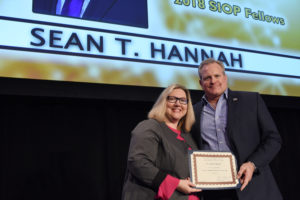Hannah named fellow in two associations

Sean Hannah, right, receives recognition as a fellow
Sean Hannah, J. Tylee Wilson Chair in Business Ethics and professor of management in the School of Business, has been inducted as a Fellow in the Association for Psychological Science (APS) and the Society for Industrial and Organizational Psychology (SIOP).
The APS awards fellow status to members who have made sustained outstanding contributions to the science of psychology in the areas of research, teaching, service, and/or application. The organization’s board of directors named Hannah to the board in May 2018. The group has 33,000 members and selects a limited set of top scholars as fellows annually.
Hannah was also selected as a fellow of the Society for Industrial and Organizational Psychology (SIOP), a professional body of some 7,000 members. SIOP selects about 20 of the world’s top organizational psychology/organizational behavior scholars as fellows each year. They represent top contributors to the range of practice, research, teaching, administration, and service in the field of industrial-organizational psychology. Like APS fellowship, it is a lifelong appointment recognizing a scholar’s contributions to the field across their career.
Hannah is also the senior research associate in the School of Business’s Center for Leadership and Character. Sean is an experienced senior leader with 26 years of experience leading large and complex organizations. His research is published in the premier management and applied psychology journals, which he synthesizes with his practical leadership experience to engage students in the classroom as well as organizations and their practicing leaders to enhance their capabilities.
“Such recognition from major organizational behavior/applied psychology organizations for Sean Hannah’s work is gratifying,” said Michelle Roehm, vice dean for faculty at the School of Business. “His research has had major impacts upon leader and character development, behavioral ethics, crisis leadership and organizational neuroscience.”
Categories: University Announcements
